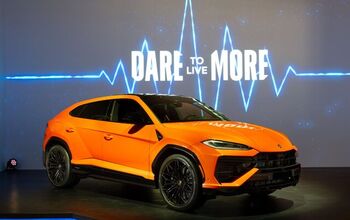Battery Tech - Not Better Range - Is Why We Should Be Excited About Chevrolet Volt

Chevrolet announced Tuesday that its new 2016 Volt would extend its all-electric range from 38 miles to 53 miles, which is a 40-percent improvement and would satisfy more than 90 percent of normal drives.
The feat itself would put the Volt on par with many all-electric commuters, whose normal range is anywhere from 60 to 90 miles. Of course, the Volt packs with it a 1.5-liter turbocharged four cylinder that bumps that range up to more than 400 miles, but that’s neither here nor there.
Let’s talk about the batteries.
On paper, the Volt’s new battery capacity is 18.4 kWh compared to last generation’s 16.5 kWh — an only 11 percent increase in capacity. Even further, there’s 96 fewer cells in the 2016 Volt compared to the current model and the batteries themselves are 20 pounds lighter.
So where does the 40-percent bump in range come from? Better batteries and a better approach.
Chevrolet has steadily improved its batteries in the Volt since the car came out in 2011 — 16 kWh to 16.5 kWh — but the bump to 18.4 kWh would be the largest improvement in six years to overall storage. Chevrolet has put the car on a diet, too, and that signals a change for the automaker from previous years.
The overall weight of the 2016 Chevrolet Volt is down 250 pounds over the current car (3,543 pounds vs. 3,781 pounds) and 100 pounds of that alone comes from slimmer energy storage.
All the little things — plus big improvements in battery tech — have equaled a 38-percent increase in EV range in six years and the car still costs $33,995, which is only $453 more than the average new car price in the United States. Range wars may become the new horsepower wars.
Almost two years ago, GM announced it was tripling its investment in its battery labs. It appears that investment is starting to pay off.

More by Aaron Cole
Latest Car Reviews
Read moreLatest Product Reviews
Read moreRecent Comments
- Zipper69 "At least Lincoln finally learned to do a better job of not appearing to have raided the Ford parts bin"But they differentiate by being bland and unadventurous and lacking a clear brand image.
- Zipper69 "The worry is that vehicles could collect and share Americans' data with the Chinese government"Presumably, via your cellphone connection? Does the average Joe in the gig economy really have "data" that will change the balance of power?
- Zipper69 Honda seem to have a comprehensive range of sedans that sell well.
- Oberkanone How long do I have to stay in this job before I get a golden parachute?I'd lower the price of the V-Series models. Improve the quality of interiors across the entire line. I'd add a sedan larger then CT5. I'd require a financial review of Celestiq. If it's not a profit center it's gone. Styling updates in the vision of the XLR to existing models. 2+2 sports coupe woutd be added. Performance in the class of AMG GT and Porsche 911 at a price just under $100k. EV models would NOT be subsidized by ICE revenue.
- NJRide Let Cadillac be Cadillac, but in the context of 2024. As a new XT5 owner (the Emerald Green got me to buy an old design) I would have happy preferred a Lyriq hybrid. Some who really like the Lyriq's package but don't want an EV will buy another model. Most will go elsewhere. I love the V6 and good but easy to use infotainment. But I know my next car will probably be more electrified w more tech.I don't think anyone is confusing my car for a Blazer but i agree the XT6 is too derivative. Frankly the Enclave looks more prestigious. The Escalade still has got it, though I would love to see the ESV make a comeback. I still think GM missed the boat by not making a Colorado based mini-Blazer and Escalade. I don't get the 2 sedans. I feel a slightly larger and more distinctly Cadillac sedan would sell better. They also need to advertise beyond the Lyriq. I don't feel other luxury players are exactly hitting it out of the park right now so a strengthened Cadillac could regain share.


































Comments
Join the conversation
CORRECTION: The current (2015) battery in the Chevy Volt is 17.1 kWh. It started as 16.0 kWh in 2011, went up to 16.5 kWh for 2013, and was further bumped up to 17.1 kWh for 2015. However, GM decided against EPA range recertification with the new battery for two reasons: 1) it was likely not worth the recertification cost for a 4-5 mile gain in EPA EV range, particularly for a last model year. 2) With the new model in the pipeline, GM stands to benefit from the outgoing model having as low a range as possible, so they can tout how amazingly improved the range is - helping to fuel articles such as this one. All in, it's actually a good call on GM's part, and owners of 2015 models have been very pleased with their unadvertised range bump.
Thanks for this article - it's nice to see some err... 'positive' news from GM, and I look forward to updates. I still might go a little bit nuts and get a Volt (the economics don't really work for me); I just would love the (ER)EV experience before I leave this mortal coil...